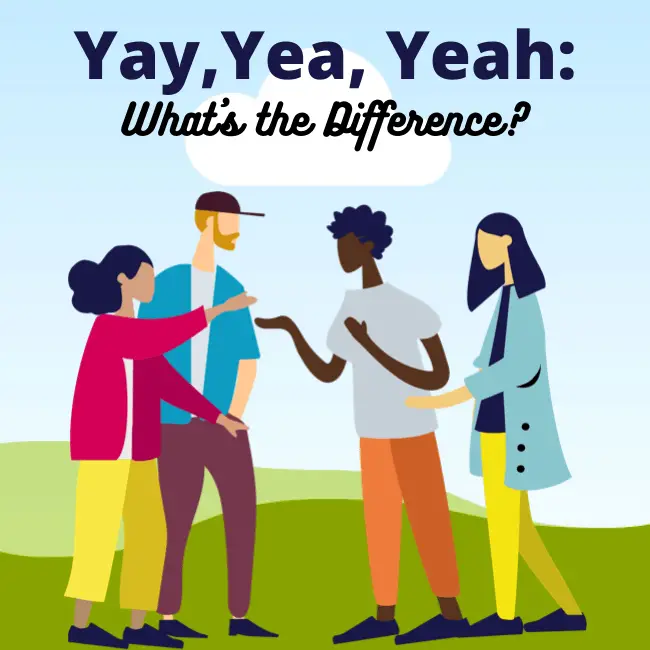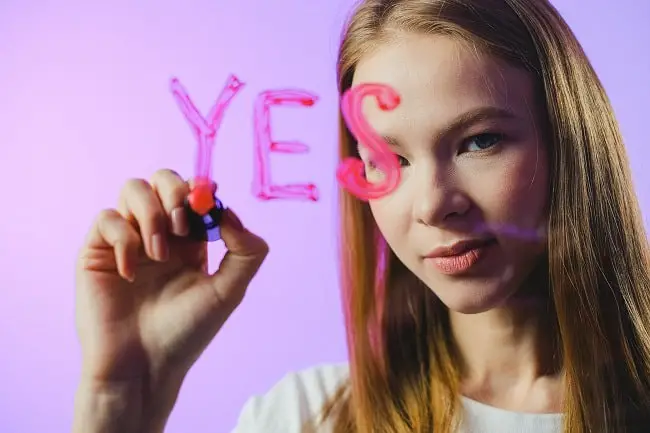
Here are three words that sound almost the same: yea, yay, and yeah.
What do they mean? And why can’t people just use one of them? Are you voting, expressing happiness, or confirming something someone asked you? Yeah – the right variation of a word makes a world of a difference.
Here’s the bottom line:
- Yay – An expression of happiness or excitement.
- Yea – You’re voting “pro” something (it’s also a slang spelling of “yes”)
- Yeah – The informal “yes”.
But there’s more nuance to these curious words. Let’s jump right in and find out what’s the right word to use in context – yay, yea, or yeah?
Yay – The Expression of Joyous Delight
The Meanings of Yay
Yay is a shout of joy or delight- it’s also how people express being happy about something exciting coming up soon. It’s used as a general cheer for your side in sports or games or when your friend just got a promotion and you’re cheering for their success – YAY! The opposite of yay is “boo”! According to Google Books Ngram, which analyzes word usage in written form throughout history, yay became widespread after the 2000s. However, there was a huge spike in the word’s usage in the 1820s – but, likely, the word wasn’t used with the same meaning as the one I described above. Yay comes with a second, older meaning too. It can sometimes mean “to the extent, amount”, and it’s probably the way people used it back in the 19th century. It’s most often used in the phrases “yay big” or “yay high”. For example: “I loved the small tree house when I was only yay big”.
Related content: Analogy vs. Metaphor – What’s The Difference?

Common Mistakes Regarding Yay – Yikes!
The most common misuse of “yay” is instead of “yea”. People will sometimes write something like “Do you vote yay or nay?” but this is a misspelling. Instead, use the spelling “yea” when you want to refer to the official voting expression. The two words are pronounced the same as “yay”, making them homophones. People often make a mistake and write “yea” or “yeah” when they want to express excitement. While the words are misspelled, the sentiment may still be sound. After all, some people also shout “Yes!” in excitement too.
Yay – Usage Examples
- “Had the campaign finance law not been passed, I was assured, SB 1062 would not have reached the governor’s desk; the politicians who backed it might not even have been elected in the first place. So yay for private funding?” Source: The Economist
- “We’d all jump in the air, clap our hands, and elatedly shout “Very good, very good YAY!” I felt like I was in the computer game The Sims.” Source: Independent
- “When the tickets came through we were like hockey, yay! Handball, hmmm…” Source: Independent
Yea – The Casual Affirmation
The Meaning of Yea
Yea is an affirmative vote or agreement. “Yea” is a very old word that means “yes”, “truly”, or “indeed”. In a formal vote, yay is the opposite of “nay”, and it’s used to express that you’re in favor of the proposal. So, it’s “yea or nay”, not “yay or nay”. The confusion comes from the identical pronunciation of the two words.

Common Mistakes Regarding Yea
One common mistake is using “yea” instead of “yeah.” While both words are used to express confirmation, “yea” was used as a formal “yes” in Old English and appeared frequently throughout history. Next, “yeah” is an informal way to express confirmation, and it only came into use in the 1960s. In addition, the two words are pronounced differently too. “Yea” is read as “yay” and rhymes with “nay”, while “yeah” sounds like “ya” or “yeh”. Still, the misspelling can sometimes be deliberate – where people choose to omit the “H” from “yeah” as a style choice.
Yea – Usage Examples
- “For a start, he would hold a referendum to say yea or nay to a new constituent assembly, to reform the constitution.” Source: The Economist
- “Maybe Monday or Tuesday we’ll be in a position to say yea or nay”. Source: Independent
Yeah – The Modern Way To Say “Yes”
The Meanings of Yeah
Out of the three words, I’m comparing today, “yeah” is the newest. It only became widespread after the 1980s and was virtually non-existent before the 1920s. Yeah is still considered colloquial, so it’s not fit for a formal or academic text. Yeah is the informal way to say “yes”. It’s an informal expression of affirmation, and it’s often used in response to something surprising or unpleasant. Yeah is also often used when someone agrees with what was just said and there isn’t anything more to say about it. However, in recent years, “yeah” has also become another way to express excitement. Sometimes, it’s used as an exclamation instead of “yay” – and it’s particularly often combined with an unusual culprit to make “Hell Yeah” or with another, more NSFW word to get a similar meaning.

Yeah – Usage Examples
“When I stop I know I’m not, but when I paint, I stand up for six hours a day and yeah, I feel I’m 30.“ Source: The Guardian “When Zuley came down, they were able to tout him as ‘Hell yeah, he’s just like you guys, he’s a detective’ and this and that,” Fallon said.” Source: The Guardian.
Honorable mention: YAS
- (often African-American Vernacular) Nonstandard spelling of yes.
- Nonstandard spelling of yous (indicating the group spoken or written to).
- Yas’m! (Yes, madam)
Wrap Up – Yes, You Rock
Yay – we’re done! I hope I explained the real differences and usage of these words, and yeah, don’t hesitate to leave a comment down below if you need more clarification or wish to add something to the conversation! Next up, you may want to explore a guide on how to write a comedy sketch.
Hey there, welcome to my blog! I'm a full-time entrepreneur building two companies, a digital marketer, and a content creator with 10+ years of experience. I started RafalReyzer.com to provide you with great tools and strategies you can use to become a proficient digital marketer and achieve freedom through online creativity. My site is a one-stop shop for digital marketers, and content enthusiasts who want to be independent, earn more money, and create beautiful things. Explore my journey here, and don't forget to get in touch if you need help with digital marketing.

